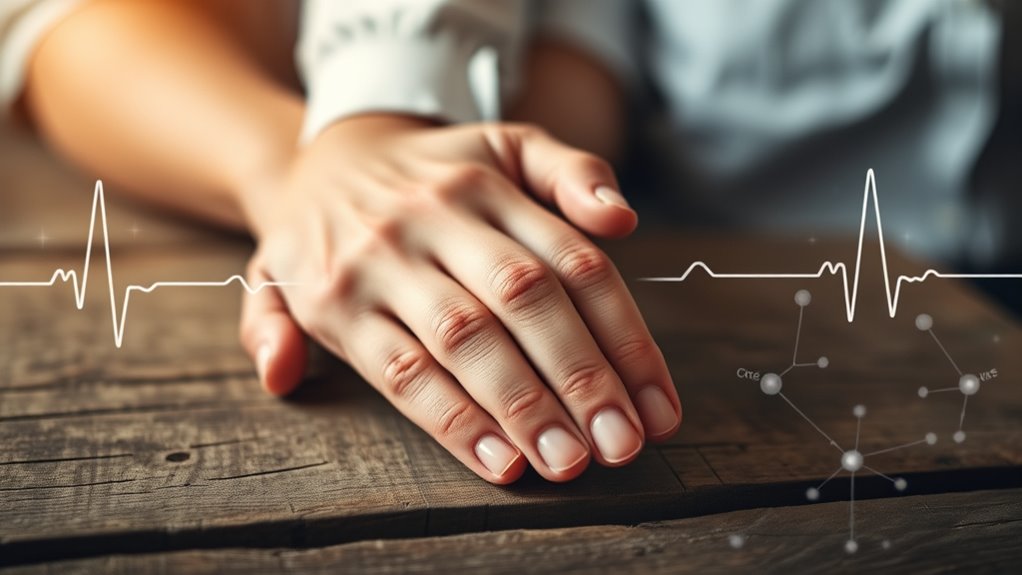In love, hormones like dopamine, oxytocin, and adrenaline trigger feelings of attraction and emotional highs, while your heart physically responds with faster beats or fluttering. But your choices also shape how these biological signals develop—deciding to trust, communicate, or slow down influences deeper bonds over time. This dance between body and mind shows that love isn’t just instinct; your decisions help steer this powerful biological process. Explore how your actions shape love’s journey more closely.
Key Takeaways
- Hormones like dopamine and oxytocin drive chemical attraction and emotional bonding, influencing love’s initial stages.
- Heart responses, such as faster heartbeat or fluttering, reflect emotional states but are not direct indicators of hormonal changes.
- Biological responses are shaped by conscious choices, like building trust and communication, which deepen emotional bonds.
- Over time, both hormonal effects and heart rhythms stabilize as love transitions from infatuation to genuine attachment.
- Recognizing the interplay between biology and decision-making empowers individuals to nurture meaningful, lasting relationships.

Hormones and the heart work together to regulate your body’s functions, but they often have competing effects. When it comes to love, your brain releases hormones like dopamine, oxytocin, and adrenaline that influence how you feel and behave. These chemicals create a sense of chemical attraction, sparking that initial rush of excitement and desire. As you connect with someone, oxytocin strengthens emotional bonds, making you crave closeness and intimacy. This chemical cocktail fuels your passion and deepens your attachment, often making you feel like you’re on an emotional high. Yet, your heart, the physical symbol of love, responds differently. It beats faster during moments of excitement and can even flutter when you see someone you care about. Your heart’s responses are rooted in your autonomic nervous system, reacting instinctively to emotional stimuli, but they don’t necessarily mirror the chemical changes in your brain.
While your hormones encourage you to seek connection based on chemical attraction, your heart’s rhythm can act as an honest indicator of your emotional state. When you’re infatuated, your heartbeat might quicken, but over time, as emotional bonds deepen, your heart may beat more steadily when you’re around that person. This interplay between hormones and the heart demonstrates how biology influences your love life, but it’s also shaped by your choices. You might feel the urge to pursue a relationship because of the rush of dopamine, yet decide to slow down and build trust, allowing emotional bonds to form more meaningfully. This active choice can influence how your body responds over time, shifting from impulsive attraction to genuine attachment.
Furthermore, understanding the safety aspects of biological responses, such as how home furnishings like heated mattress pads are designed with safety features, can remind you to prioritize your well-being in all areas of life, including relationships.
Understanding this dynamic helps you see that love isn’t purely a biological instinct or just a matter of heart. It’s a complex dance where hormones and your physical responses guide you, but your decisions and actions shape the outcome. You might experience a surge of chemical attraction that pulls you toward someone, but it’s your conscious efforts—trust, communication, and commitment—that foster lasting emotional bonds. The interplay between hormones and the heart reminds you that love is both biology and choice. Your body produces signals, but how you interpret and act on them ultimately determines the depth and quality of your relationships. Recognizing this balance can empower you to navigate love with awareness, blending instinct with intention.
Frequently Asked Questions
Can Hormonal Changes Affect Long-Term Relationship Success?
Hormonal fluctuations can markedly impact your long-term relationship success. You might notice neurochemical effects that influence your feelings, attachment, and attraction over time. These hormonal changes can affect your mood, intimacy, and emotional bond. While biology plays a role, your conscious choices and efforts are equally important. By understanding these neurochemical effects, you can better manage hormonal fluctuations and nurture a healthier, more resilient relationship in the long run.
How Do Cultural Factors Influence Love Decisions Beyond Biology?
You might find that cultural norms and societal expectations subtly shape your love decisions, guiding what feels acceptable or desirable. These influences often act as gentle currents, steering choices without you fully realizing it. Beyond biology, your environment molds your perceptions of love and partnership. By understanding how societal pressures impact you, you gain awareness, empowering you to make more authentic choices aligned with your true desires, rather than just external influences.
Are There Ways to Consciously Override Biological Impulses?
You can consciously override biological impulses through neurochemical manipulation and deliberate decision-making. By recognizing your automatic reactions, you choose to pause and reflect, shifting focus away from instinctual urges. Techniques like mindfulness, cognitive behavioral strategies, and even medication can help you regulate your neurochemistry. Ultimately, your conscious effort empowers you to make love decisions based on values and reasoning rather than purely biological drives.
What Role Does Individual Personality Play in Love Choices?
Your personality traits heavily influence your love choices, shaping your love preferences and how you connect with others. You tend to seek partners who resonate with your values, interests, and emotional style. Recognizing your personality traits helps you understand why you’re attracted to certain qualities. By consciously reflecting on your love preferences, you can make more intentional choices, balancing biology’s impulses with your unique personality and relationship goals.
Can Understanding Hormones Improve Relationship Counseling Strategies?
Imagine revealing hidden insights into love—can understanding hormones improve relationship counseling? You might be surprised. By exploring neurotransmitter effects and hormonal therapy, you discover how biology influences emotions and attachment. This knowledge allows you to tailor strategies that address underlying biological factors, potentially fostering deeper connections. Recognizing the biological underpinnings can empower you to guide couples more effectively, blending science with emotional understanding for stronger, healthier relationships.
Conclusion
You see, love is a dance between biology and choice, like a delicate balance on a tightrope. Hormones may light the fire, but your decisions guide where that flame burns. By understanding both, you hold the brush to paint your own love story. Remember, you’re the captain of your ship, steering through the storm of emotions with both instinct and intention. Embrace this harmony, and your heart’s voyage becomes a masterpiece in the making.










